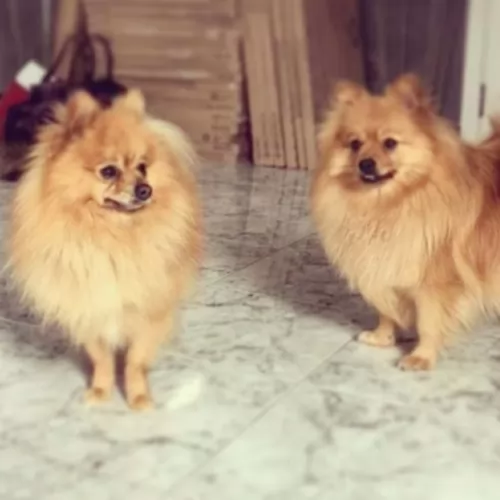 Petzlover
Petzlover Corgi is originated from United Kingdom but Malti-Pom is originated from United States. Both Corgi and Malti-Pom are having almost same height. Corgi may weigh 9 kg / 20 pounds more than Malti-Pom. Both Corgi and Malti-Pom has almost same life span. Corgi may have more litter size than Malti-Pom. Corgi requires Low Maintenance. But Malti-Pom requires Moderate Maintenance
Corgi is originated from United Kingdom but Malti-Pom is originated from United States. Both Corgi and Malti-Pom are having almost same height. Corgi may weigh 9 kg / 20 pounds more than Malti-Pom. Both Corgi and Malti-Pom has almost same life span. Corgi may have more litter size than Malti-Pom. Corgi requires Low Maintenance. But Malti-Pom requires Moderate Maintenance
 Known as a cattle herding dog breed, the Corgi hails from Pembrokeshire, Wales. You get 2 breeds – the Cardigan Welsh Corgi and the Welsh Corgi.
Known as a cattle herding dog breed, the Corgi hails from Pembrokeshire, Wales. You get 2 breeds – the Cardigan Welsh Corgi and the Welsh Corgi.
The word ‘Korgi’ actually means ‘dwarf dog’. According to some, the small dog’s history goes back as far as 1107AD, but when you start doing research, you find that the Pembroke Welsh Corgi doesn’t have a traceable breed history.
The Pembrokeshire Corgi was officially recognized by the Kennel Club in the United Kingdom in 1934 and is a breed separate from the Cardiganshire Corgi.
 The sweet little Malti Pom is a dog which comes from crossing two purebreds – the Maltese Poodle and the Pomeranian.
The sweet little Malti Pom is a dog which comes from crossing two purebreds – the Maltese Poodle and the Pomeranian.
The appearance of this dog will vary according to how much of each breed is in the dog. The exact origins of the Maltipom breed are unknown but many new dog breeds have originated in the United States.
The Maltipom is also not recognized by the AKC because it’s a hybrid of two pure breeds and not looked upon as a new breed. It is however recognized by the American Canine Hybrid Club.
 The Corgi is a small to medium sized dog, standing at 25 to 30cm and weighs between 10 to 14kg.
The Corgi is a small to medium sized dog, standing at 25 to 30cm and weighs between 10 to 14kg.
The coat of the Corgi is fairly short to medium length and is thick. You’ll find him to be available in colors such as red, fawn, black and tan and with white markings.
He has a sharp, intelligent face with an amicable expression. Looking much like a fox with short legs, he has a long, low-set body body and is a sturdy dog. His ears also stand erect and he has a docked tail.
 The Malti-Pom is a crossbreed, so pinpointing his exact size can be somewhat difficult, but you can expect him to be in the region of 20 to 28cm and weigh in at about 2 to 5kg.
The Malti-Pom is a crossbreed, so pinpointing his exact size can be somewhat difficult, but you can expect him to be in the region of 20 to 28cm and weigh in at about 2 to 5kg.
Both the Maltese and the Pomeranian are both toy dogs, so the Malti-Pom is almost sure to be a small dog. His appearance will also vary depending on which side he inherits most of his looks from. Generally though, he has a long coat of straight, soft hair.
He is a low shedder and with the poodle side of him he is looked upon as being hypoallergenic. The coat can be cream, apricot, white or black as well as a combination of these colors.
This is such a friendly, amicable little dog. He is good with children and can get on well with other pets in the home.Children should be taught to be gentle with any dog, but particularly a small one like this.
The Malti-pom is extremely loyal and affectionate with its family members, but ends to form a special bond with one member of its family.
These little dogs are generally reserved with strangers. They are well-behaved, sociable and can mix well with children and pets in the home. These toy dogs are clever so you won't battle with him with training and socialization.
Although the Maltipom looks cute and is an amicable dog, he can bark quite aggressively when he encounters strangers who he believes might harm his family. He makes a good watchdog.
 The sweet little Corgi is well known with his association with Britain’s Queen Elizabeth who has always loved these dogs with their long bodies and short legs. But while the Corgi may well be associated with royalty, he isn’t too snooty by any means to be your pet.
The sweet little Corgi is well known with his association with Britain’s Queen Elizabeth who has always loved these dogs with their long bodies and short legs. But while the Corgi may well be associated with royalty, he isn’t too snooty by any means to be your pet.
He has got a wonderful personality, and he is just waiting to be allowed into your household where he will prove to be a loving, devoted companion and friend.
 Because your Malti-Pom comes from two different dog breeds, you can’t really say what kind of personality traits he will inherit.
Because your Malti-Pom comes from two different dog breeds, you can’t really say what kind of personality traits he will inherit.
Both the Maltese and the Pom are small lap-type dogs who are essentially companion dogs. You can be sure your Malti-pom is going to be cute, social, energetic, vibrant and loving. They are able to adapt well to life in the city or the countryside and a nice walk every day will go down well in terms of exercise. It give your pet a chance to get outdoors and to sniff new scents.
With the Maltese and the Pom being the two parents of this dog breed, you can be sure that you’re going to have a splendid little pet who is guaranteed to bring lots of smiles into your home from his jovial, entertaining ways
 A corgi, when he is well looked after, can live to be anything from 12 to 15 years of age. However even this sturdy dog may well be susceptible to some of the more common dog illnesses, such as hip dysplasia and degenerative myelopathy.
A corgi, when he is well looked after, can live to be anything from 12 to 15 years of age. However even this sturdy dog may well be susceptible to some of the more common dog illnesses, such as hip dysplasia and degenerative myelopathy.
Also you have to be careful with your Corgi and make sure that he doesn’t gain weight as this weight gain can bring with it a host of health complications.
Hip dysplasia with your Corgi is about an abnormal joint structure where the bones lose contact with each other. This parting of the bones is known as subluxation, and it is this subluxation that can cause your pet pain and discomfort and lead to osteoarthritis.
This disease isn’t reserved for old dogs either, and some young dogs can begin to show signs of this disease before they reach their first birthday. Without taking your dog to the vet and having medical intervention, your pet may eventually be unable to walk.
It is so sad when Degenerative Myelopathy invades your pet as it is a devastating disease watching your pet become paralyzed. The disease seems to come on when then dog is between 8 and 14 years of age where your pet loses co-ordination in the hind limbs, getting worse until he can no longer walk. Often your dog can no longer control his urine output.
There are no real treatments that have stopped the progression of the disease and your vet may suggest treatments that can make your pet more comfortable You vet may compassionately suggest your dog be put down, particularly for those people who can’t afford treatment.
 Fortunately, the Maltipom is considered to be a healthy dog, and he can live with you for a good number of years with good care. The Maltipom could develop heart issues.
Fortunately, the Maltipom is considered to be a healthy dog, and he can live with you for a good number of years with good care. The Maltipom could develop heart issues.
Heart disease is fairly common in dogs and some symptoms will include a cough, loss of appetite and he might tire easily. One of the common types of heart disease is degenerative valvular disease, where the heart valves fail.
It is believed that degenerative valve disease is a heart disease which accounts for about 75% of all heart disease in dogs. Diagnosing heart disease requires a number of different testing methods.
 The Corgi isn’t a particularly heavy shedder, so a brush down twice a week will be excellent for his thick coat. And of coarse he will thrive on the attention given to him during the brushing session.
The Corgi isn’t a particularly heavy shedder, so a brush down twice a week will be excellent for his thick coat. And of coarse he will thrive on the attention given to him during the brushing session.
Corgis love walks and sniffing around as they go along. They’re energetic dogs so you’ll need to include him in your daily walks which he just loves, and include him in some ball games.
Corgis may be short in stature but they are robust dogs – sturdily built. They are active dogs and can use up a lot of calories. They will certainly require a diet that features good quality protein.
Feed your Corgi a good quality food designed for special life stages – puppy, adult, pregnant female, senior dog and also dogs with illnesses.
Most Corgis do well having 2 meals of kibble a day. Puppies usually eat 4 meals a day until they are old enough to move onto an adult feeding schedule. Include cooked rice, meat and vegetables in his diet as well as raw meat from time to time and ensure there is always a bowl of clean, cool water available.
 The Maltipom is a tiny dog, and that’s an advantage actually as he isn’t going to cost you too much to feed. Half a cup of food in he morning and another in the evening will keep him satisfied.
The Maltipom is a tiny dog, and that’s an advantage actually as he isn’t going to cost you too much to feed. Half a cup of food in he morning and another in the evening will keep him satisfied.
If you give him commercially manufactured food, choose a high quality one specially made for small dogs. You can chop up cooked chicken, brown rice or pasta and some cooked vegetables finely and add this to his dry kibble from time to time as a tasty treat.
A tiny little bit of raw meat once in a while will also keep him healthy. Keep things simple – don’t try all sorts of weird foods with him as he can battle with digestive problems.
Groom your pet. Brush him at least twice a week. Check his eyes and ears for infection and remember to brush his teeth at least 2 or 3 times a week with special canine toothbrush and toothpaste.
Make sure he is exercised. He'll love a walk each day.